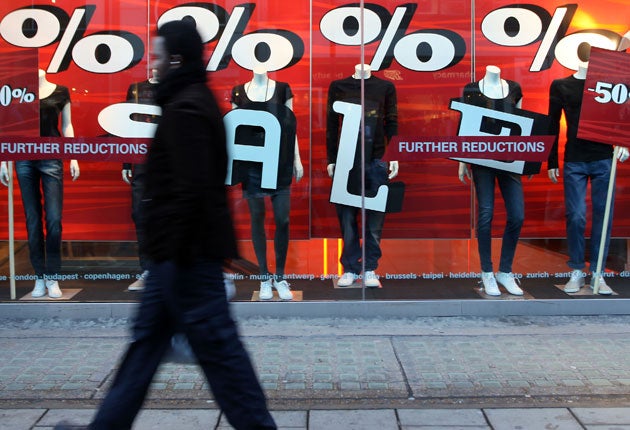Ill winds blow British economy no good

Your support helps us to tell the story
From reproductive rights to climate change to Big Tech, The Independent is on the ground when the story is developing. Whether it's investigating the financials of Elon Musk's pro-Trump PAC or producing our latest documentary, 'The A Word', which shines a light on the American women fighting for reproductive rights, we know how important it is to parse out the facts from the messaging.
At such a critical moment in US history, we need reporters on the ground. Your donation allows us to keep sending journalists to speak to both sides of the story.
The Independent is trusted by Americans across the entire political spectrum. And unlike many other quality news outlets, we choose not to lock Americans out of our reporting and analysis with paywalls. We believe quality journalism should be available to everyone, paid for by those who can afford it.
Your support makes all the difference.The bad weather will "significantly" affect the UK economy and damage a still fragile recovery, according to leading economic researchers – with higher gas and electricity bills likely to follow record wholesale prices as demand for energy surges. Utility firms are likely to pass on these increases, on top of substantial rises already announced.
Analysts at HSBC say that, based on the experience of previous bad weather episodes in recent decades, £3bn could be lost in output. Other estimates range as high as £13bn – £500 per family.
Given the impact of public spending cuts and a weaker outlook for the European economy, where the weather has also been extreme, much of the hoped-for expansion in the last few months of 2010 will be lost, some of it forever, and growth may be pushed uncomfortably close to zero.
Some of the expenditure that had been expected to be "brought forward" ahead of the 4 January 2011 VAT hike may now simply not take place.
Spending at bars, clubs, restaurants and hotels is also unlikely to be made up later, and some Christmas presents will remain unbought.
The transport and construction sectors are two other high-profile losers; and disruption in supply chains promises to make the impact surprisingly severe for some companies, especially smaller ones even now being refused bridging finance by the banks. Many products are stuck at container ports and spare parts for vital machinery cannot be flown in, for example. Unemployment may rise as a result.
The greatest medium-term danger if the weather persists is to energy production, especially gas.
There will be some winners. The snow and ice has resulted in a doubling of car accident claims, with repair shops looking forward to a mini bonanza from fixing dents and prangs. And much output will be made up as the ice and snow thaw – as the Office for National Statistics suggests was the case during the bad weather last winter, when the economy bounced back strongly in the second quarter of the year.
There is evidence that inflation may be pushed higher by the demand for energy and shortages of some foods in the days and weeks ahead.
As UK wholesale spot gas prices jumped to a two-year high on near record demand, up one-third on a normal December, consumers will have to cope with a big increase in their heating bills over the next few months, as the utility companies seek to pass on the rise in domestic bills. That, in turn, will add to inflation and makes a rise in interest rates more likely. A combination of higher usage and rising tariffs on one of the most basic of all living costs will squeeze household budgets and their spending on other items.
If past winters are any guide, some crops will be hit, at a time when food prices are rising at their fastest rates since the 1970s – up 1.6 per cent in November alone, an annualised rate of 19.2 per cent. Freakish weather round the world has hit staples such as cereals; now home-grown produce, especially vegetables, will join the new era of dear food.
Thus, it also seems likely that the bad weather will have a noticeable impact on inflation, already way above the official target, and add to pressure on the Bank of England to raise interest rates. The need to maintain the Bank's credibility may tip the balance on the Monetary Policy Committee towards raising rates sooner rather than later – and that will have a potentially much bigger impact on mortgage bills.
New Year 2011 is likely to be far from prosperous for many Britons.
Join our commenting forum
Join thought-provoking conversations, follow other Independent readers and see their replies
Comments